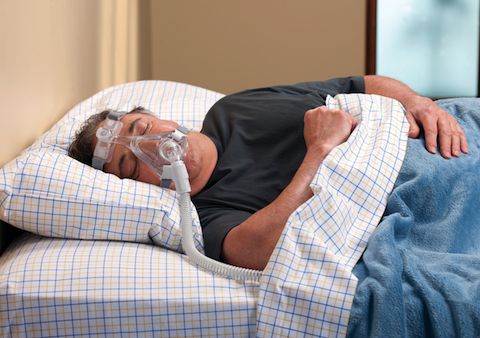Obstructive Sleep Apnea Affects Cognition in Parkinson’s Disease
Linda Peckel | April 12, 2017 | NeurologyAdvisor.com
 Obstructive sleep apnea (OSA) in patients with Parkinson’s disease (PD) is linked to higher levels of sleepiness and lower cognitive function scores, according to results published in Neurology.1
Obstructive sleep apnea (OSA) in patients with Parkinson’s disease (PD) is linked to higher levels of sleepiness and lower cognitive function scores, according to results published in Neurology.1
Cognitive dysfunction is one of the nonmotor symptoms (NMS) of PD that is associated with lower quality of life.2 Further, dementia occurs in about 30% of patients with PD, reaching as high as 80% in patients with advanced age and disease.3 Cognitive and psychomotor impairments have also been tied to obstructive sleep apnea, likely related to disrupted sleep and hypoxemia.4
Victoria Mercy, MD, of Universidad del Desarrollo in Santiago, Chile, and colleagues at McGill University Health Centre in Montreal, Quebec, Canada sought to examine the relationship between PD-associated non-motor symptoms and OSA.
Participants with idiopathic PD were included in the study and assessed with an overnight polysomnography. Participants also underwent assessments for PD severity with the Movement Disorder Society Unified Parkinson’s Disease Rating Scale (MDS-UPDRS) and the Hoehn & Yahr (H&Y) Scale. Along with the Montreal Cognitive Assessment (MoCA), participants were assessed for sleepiness, fatigue, depression, and anxiety. Patients with a history of uncontrolled hypertension, unstable cardiac disease, cancer, stroke, treatment for OSA, or with a life expectancy of less than 6 months were excluded from the study.
The study included 67 patients with a mean age of 64.4 and a mean MDS-UPDRS score of 21.9. OSA, as defined as an apnea-hypopnea index (AHI) of 15 or more per hour, was diagnosed in 70.1% of the participants (n=47, mean AHI 27.1/h).
One or more nonmotor symptoms were reported in 85% of the participants (n=57). Participants with OSA tended to have higher mean Epworth Sleepiness Scales (ESS) (P =.028) and lower mean MoCA scores (P =.041). After adjusting for age, sex, and body mass index, there was a significant association between AHI and higher levels of sleepiness (ESS β=0.0670, P =.031) and worse cognition (MoCA β= -0.0520, P =.043). Further, there was a linear decrease in the MoCA score as the severity of OSA increased (P =.02 for trend).
Of interest, the investigators did not find a relationship between the degree of sleepiness and cognitive impairment (ESS vs MoCA, β= −0.099, 95% CI, −0.289-0.0906; P =.30). ESS was associated with both intermittent hypoxemia and respiratory arousal; however MoCA was only negatively associated with respiratory arousal.
Although further studies are needed, the investigators concluded that, “We have found that in patients with PD, OSA was associated with excessive daytime sleepiness and cognitive dysfunction. The deterioration of cognition appears to be due to OSA-related sleep fragmentation rather than intermittent hypoxemia.”1
Disclosures: The study was funded by the Department of Medicine and Research Institute at McGill University Health Centre. Drs Lafontaine, Kimoff, and Kaminska report disclosures related to pharmaceutical and medical device companies.1
References
- Mery VP, Gros P, Lafontaine AL, et al. Reduced cognitive function in patients with Parkinson disease and obstructive sleep apnea. Neurology. 2017;88(12):1120-1128.
- Berganzo K, Tijero B, Gonzalez-Eizaguirre A, et al. Motor and non-motor symptoms of Parkinson’s disease and their impact on quality of life and on different clinical subgroups [in English, Spanish]. Neurologia. 2016;31:585-591.
- Hely MA, Reid WG, Adena MA, Halliday GM, Morris JG. The Sydney multicenter study of Parkinson’s disease: the inevitability of dementia at 20 years. Mov Disord. 2008;23:837-844.
- Bucks RS, OlaitheM, Eastwood P. Neurocognitive function in obstructive sleep apnoea: a meta-review. Respirology. 2013;18:61-70.




